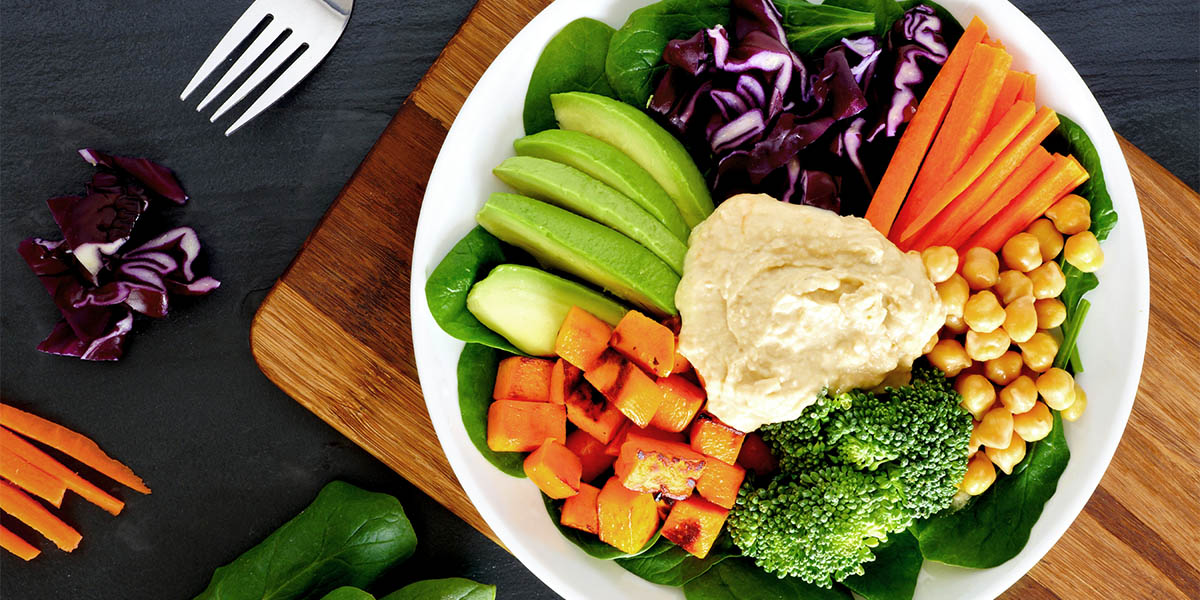Hidden Ingredients in Sugar Free Sauces: What to Watch Out For
Hidden Ingredients in Sugar Free Sauces: What to Watch Out For
Blog Article
Everything About Healthy And Balanced Food: Benefits of Embracing Plant Based Alternatives
The conversation bordering plant-based diet plans has gotten considerable interest in recent times. Numerous individuals are discovering the possible health advantages, dietary benefits, and ecological effects related to these dietary selections. As individuals come to be much more knowledgeable about their food's impact on health and sustainability, inquiries arise about the functionalities of taking on such a lifestyle. What details modifications can one anticipate, and just how might these options reshape not only individual wellness however additionally the earth's future?
Comprehending Plant-Based Diet Regimens
Numerous individuals connect plant-based diet plans mainly with vegetarianism or veganism, these diet plans can include a large array of consuming patterns that prioritize whole, minimally refined plant foods. Such diets usually include fruits, veggies, whole grains, vegetables, seeds, and nuts, while restricting or removing pet items. This versatility enables individuals to tailor their dietary choices according to nutritional demands and personal choices. Some might embrace a largely plant-based diet while still periodically consuming meat or dairy, usually described as a flexitarian technique. The emphasis continues to be on including more plant foods, which can bring about a varied array of flavors and dishes. Understanding these various analyses of plant-based eating is essential for valuing its availability and allure in contemporary food culture.
Health And Wellness Perks of Plant-Based Foods
The health benefits of plant-based foods are considerable, supplying a nutrient thickness benefit that sustains overall well-being. Study suggests that these foods can boost heart health and play an essential function in effective weight management. By including more plant-based choices, individuals might enhance their nutritional options and advertise long-lasting health and wellness.
Nutrient Thickness Benefit
Nutrient thickness plays a crucial role in the health and wellness benefits of plant-based foods, making them a compelling selection for those looking for a well balanced diet. Plant-based foods, such as fruits, veggies, beans, nuts, and entire grains, are frequently rich in vital vitamins, minerals, and antioxidants while being reduced in calories. This high nutrient thickness enables people to take in fewer calories while still satisfying their nutritional needs. Additionally, these foods are packed with nutritional fiber, advertising digestive system wellness and assisting in weight administration. By incorporating nutrient-dense plant-based choices, consumers can improve their overall wellness, sustain their immune systems, and decrease the danger of chronic conditions. Inevitably, the nutrient thickness of plant-based foods highlights their value in a health-conscious way of life.
Heart Health Enhancement

Weight Monitoring Support
Along with promoting heart wellness, a plant-based diet regimen can significantly help in weight monitoring. This nutritional approach highlights whole foods such as fruits, vegetables, legumes, nuts, and entire grains, which are usually lower in calories and higher in fiber compared to animal-based products. The high fiber material aids raise satiation, lowering total calorie intake. Plant-based diet regimens are frequently rich in crucial nutrients while low in harmful fats, making it less complicated to keep a healthy weight. Research study suggests that individuals who take on a plant-based way of life have a tendency to have reduced body mass indexes (BMIs) and experience more successful weight loss contrasted to those that eat meat-heavy diet plans. As a result, embracing plant-based choices is a tactical option for efficient weight administration
Nutritional Worth of Plant-Based Active Ingredients
Plant-based active ingredients are rich in crucial nutrients, using a diverse variety of vitamins, minerals, and antioxidants that contribute to general health and wellness. A comparison of healthy go to this site protein sources discloses that while pet products are often deemed remarkable, several plant-based choices give adequate protein and other useful substances. Recognizing the nutritional worth of these active ingredients can assist people make educated dietary choices.
Crucial Nutrients in Plants
Nutrient-rich ingredients discovered in plants use a diverse range of necessary nutrients that contribute greatly to overall wellness. These components are rich in vitamins A, C, and K, which support immune feature, vision, and blood clot, specifically. In addition, plants supply essential minerals such as calcium, potassium, and magnesium, critical for heart health and wellness, muscular tissue feature, and bone strength. The visibility of fiber in plant-based foods help food digestion and promotes a healthy gut microbiome. Antioxidants, found generously in vegetables and fruits, assistance fight oxidative stress and anxiety and minimize inflammation. In addition, many plant foods are low in calories yet high in nutrients, making them an outstanding choice for those seeking to maintain see this page a healthy and balanced weight while ensuring perfect nutrient intake.
Contrasting Protein Sources
Healthy protein sources differ substantially in their dietary accounts, with plant-based components offering special advantages. Unlike pet healthy proteins, which commonly consist of hydrogenated fats and cholesterol, plant proteins have a tendency to be lower in these undesirable elements. Legumes, nuts, seeds, and entire grains are rich in vital amino acids, fiber, vitamins, and minerals. For circumstances, lentils offer high protein material along with significant iron and folate, while quinoa is a full healthy protein, using all nine vital amino acids. Additionally, plant-based proteins are frequently accompanied by antioxidants and phytochemicals that sustain total health and wellness. The shift to plant-based protein resources not just enhances nutritional intake however likewise straightens with lasting dietary techniques, minimizing ecological impact and advertising long-lasting health advantages.
Ecological Impact of Plant-Based Eating
As awareness of environment change grows, several individuals are discovering sustainable nutritional options that can considerably decrease their ecological footprint. Plant-based consuming has emerged as a substantial contributor to minimizing greenhouse gas exhausts, which are mainly connected with animals production. The cultivation of fruits, vegetables, veggies, and grains commonly needs less resources, such as water and land, contrasted to pet farming. Additionally, plant-based diet regimens can result in lowered deforestation, as less land is needed for navigate to these guys grazing animals or expanding animal feed. By moving in the direction of plant-based options, customers can sustain biodiversity and advertise much healthier communities. Overall, embracing plant-based consuming not just advantages individual wellness yet additionally represents an important step toward ecological sustainability and conservation efforts.
Overcoming Common Misconceptions
While lots of individuals acknowledge the benefits of a plant-based diet regimen, a number of misconceptions usually hinder them from totally accepting this way of life. An usual belief is that plant-based diets do not have enough protein; nevertheless, various plant sources, such as beans, nuts, and tofu, supply ample healthy protein. In addition, some presume that this diet plan is pricey, when in truth, staples like beans, rice, and seasonal veggies can be fairly budget-friendly. Another mistaken belief is that plant-based eating is overly limiting, whereas it really offers a varied selection of foods and flavors. Numerous worry that a plant-based diet plan may lead to shortages, yet with appropriate preparation, individuals can get all essential nutrients, including minerals and vitamins, while enjoying a broad range of delicious meals.
Tips for Transitioning to a Plant-Based Way of life
Making the shift to a plant-based way of life can be an enriching experience, though it often needs some advice to navigate the first modifications. People are encouraged to begin progressively, integrating even more fruits, veggies, beans, and whole grains into their meals while reducing meat and milk consumption. Meal planning is important; preparing a weekly menu can aid reduce the adjustment and avoid last-minute harmful options. Exploring cooking techniques and new dishes can additionally boost the experience and maintain exhilaration concerning plant-based eating. Furthermore, signing up with support system or communities can provide inspiration and share important ideas. Lastly, remaining educated regarding nourishment assurances well balanced dishes, protecting against deficiencies while cultivating a healthy, enjoyable plant-based way of life.
Delicious Plant-Based Dish Concepts
Checking out scrumptious plant-based dish ideas can motivate people to embrace an extra nourishing diet regimen. One prominent choice is a passionate quinoa salad, featuring cherry tomatoes, cucumber, and a spicy lemon-tahini clothing. One more fave is a full-flavored lentil stew, packed with carrots, celery, and fragrant herbs, best for a calming supper. For breakfast, overnight oats made with almond milk, chia seeds, and covered with fresh berries provide a nourishing beginning to the day. Additionally, a dynamic vegetable stir-fry with tofu and a selection of vivid veggies can be a fast yet pleasing meal. Finally, velvety avocado toast on whole-grain bread, sprayed with seeds and flavors, supplies a simple yet flavorful snack. These dishes display the selection and splendor of plant-based consuming.

Regularly Asked Concerns
Can a Plant-Based Diet Give Sufficient Protein?
The inquiry of whether a plant-based diet plan can provide enough protein is usual. Many sources, consisting of vegetables, nuts, seeds, and entire grains, can satisfy healthy protein needs effectively, sustaining a balanced and nourishing diet plan for people.
Are Plant-Based Diet Plans Ideal for Children?
The viability of plant-based diets for youngsters depends on mindful planning. Appropriate nutrients must be assured, including vitamins, proteins, and minerals. With appropriate assistance, such diets can support healthy and balanced development and advancement in youngsters.
How Do I Eat in restaurants on a Plant-Based Diet?
Eating out on a plant-based diet regimen involves looking for dining establishments with diverse menus, requesting for modifications, and checking out vegan-friendly alternatives. Planning ahead and interacting dietary choices can boost the dining experience while preserving nutritional selections.
What Prevail Allergens in Plant-Based Foods?
Typical irritants in plant-based foods consist of soy, gluten, nuts, and seeds - Gluten Free BBQ Sauce. People following a plant-based diet ought to know these irritants and review labels thoroughly to prevent negative responses and assure secure intake
Can Plant-Based Diets Aid With Weight-loss?
Research study shows that taking on a plant-based diet regimen might promote weight reduction due to its usually lower calorie density and higher fiber content. This combination can enhance satiety, helping people handle their calorie consumption successfully. Lots of individuals connect plant-based diet plans primarily with vegetarianism or veganism, these diet plans can encompass a wide range of consuming patterns that focus on entire, minimally processed plant foods. Nutrient density plays an important role in the health benefits of plant-based foods, making them a compelling selection for those seeking a balanced diet plan. Plant-based diet plans have actually been shown to markedly boost heart wellness, as they commonly consist of aspects that support cardiovascular feature. In enhancement to advertising heart wellness, a plant-based diet plan can considerably assist in weight administration. An usual belief is that plant-based diet plans lack enough healthy protein; however, countless plant resources, such as vegetables, nuts, and tofu, offer enough healthy protein.
Report this page